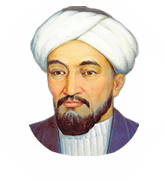
GEOMETRY OF AL-FARABI IN MODERN MATHEMATICAL EDUCATION
Y.Y. Bidaibekov, G.B. Kamalova, B.G. Bostanov, Zh.K. Akkassynova
By following A.Kubesov's studies a geometric heritage, geometric construction algorithms are considered and possibilities of their use in modern mathematical education are determined in the article. It is caused due to uniqueness of al-Farabi's studies, which is reflected in use of algorithmic approach in solution of mathematical problems and application-oriented direction of doing research.
Keywords: mathematical heritage, geometric construction, construction with help of compass and ruler, algorithm, algorithmic approach, application-oriented direction, mathematical education.
Al-Farabi (870-950 yy.) – is one of the greatest scholars, thinkers and encyclopaedists of the middle ages, native of Kazakhstan and a representative of the ancient Turkic tribes, on which was formed the current Kazakh people. As the owner of exceptional abilities in all fields of knowledge, he owns a place of honor among prominent scholars of the medieval East, who during his lifetime was named as the second teacher - «al - Muallim Al-Thani» after Aristotle.
Al-Farabi is considered to be one of the founders of the progressive public and philosophical ideas in the Muslim East, including Central Asia and Kazakhstan, where such philosophers and scholars as Ibn-Xing, al-Biruni, Omar Khayyam, Nasr ad-Din at-Tusi and others were born. Except purely philosophical and logical writings he wrote many natural and mathematical, and, natural and philosophical works. Al-Farabi left richer scientific heritage which influenced on further development of the science both in the West and in the East. Research of this thinker's scientific heritage, determination of its influence on world science and civilization were and still going to be actual nowadays.
Download (doc)




.png)